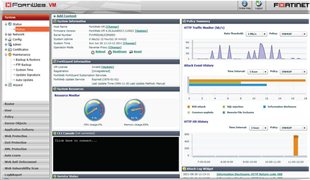 Fortinet, Barracuda Networks, and Intel are the top three in ABI Research’s latest Competitive Assessment on “Enterprise Virtual Network Security Appliances”. The assessment looks at overall network security market shares in addition to a vendor matrix where top providers of virtual network security appliances.
Fortinet, Barracuda Networks, and Intel are the top three in ABI Research’s latest Competitive Assessment on “Enterprise Virtual Network Security Appliances”. The assessment looks at overall network security market shares in addition to a vendor matrix where top providers of virtual network security appliances.  Fortinet, Barracuda Networks, and Intel are the top three in ABI Research’s latest Competitive Assessment on “Enterprise Virtual Network Security Appliances”. The assessment looks at overall network security market shares in addition to a vendor matrix where top providers of virtual network security appliances were analysed against selected criteria in "Innovation" and "Implementation".
Fortinet, Barracuda Networks, and Intel are the top three in ABI Research’s latest Competitive Assessment on “Enterprise Virtual Network Security Appliances”. The assessment looks at overall network security market shares in addition to a vendor matrix where top providers of virtual network security appliances were analysed against selected criteria in "Innovation" and "Implementation".
Fortinet comes out first due to its highly modular network security solutions for the VM space, it says, offering the most comprehensive VM product lines currently on the market. Not only does it have support for various network requirements, it has invested significantly in a wide-ranging and varied security feature set for a dedicated VM product line that can be easily integrated and assimilated.
Barracuda Networks ranks second. Although Barracuda Networks was the smallest company evaluated in this assessment, it did remarkably well, says ABI, ranking second overall. This is in large part due to its dedicated focus on expanding its network security appliances virtually, not only to private cloud scenarios, but with particular focus on the public cloud sphere of application.
Intel places third, due in large part to the McAfee offerings which addresses both cloud and virtualization demands. The acquisition of Stonesoft further anchored Intel’s McAfee to the network security space, with its next-generation firewall available as a physical appliance, a software solution, or a virtual appliance.
Michela Menting, cybersecurity practice director, comments, “Virtualisation is playing an increasingly important role in next-generation network security offerings. The market demand for security appliances that can capture network traffic in virtualized scenarios, and increasingly in off-premise public cloud environments, requires a flexibility that can be met by virtualizing the appliances themselves. While hardware solutions will still remain the overarching status quo, the growing interest in NFV-type security solutions for the network is undeniably on the rise. Enterprise virtual network security appliances in particular can play that role.”